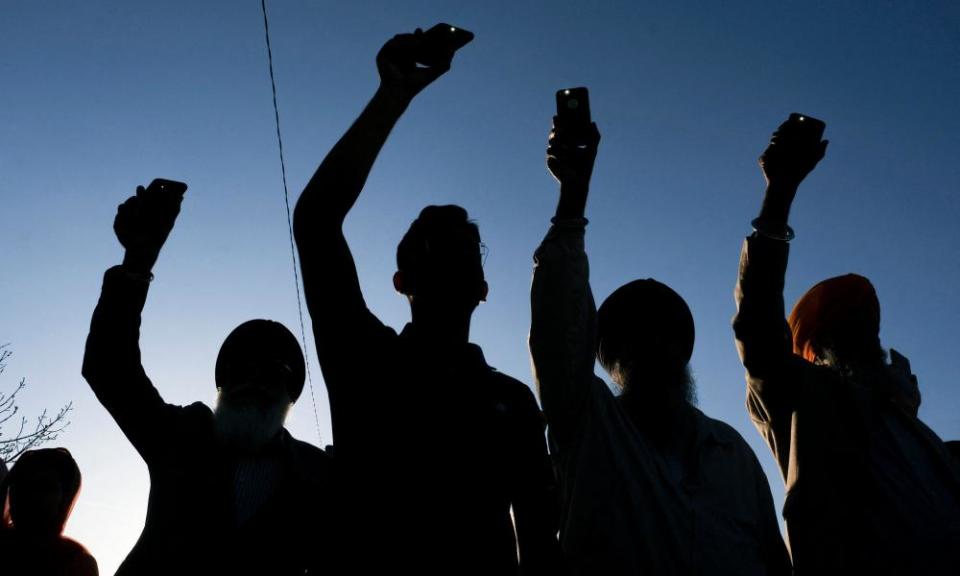Indianapolis shooting: gunman bought two rifles after police seized his shotgun

A gunman who murdered eight people at a FedEx warehouse in Indianapolis legally purchased the two semi-automatic rifles he used in the attack, months after a shotgun he owned was confiscated by police over concerns around his mental health.
Brandon Hole, 19, who killed himself at the conclusion of the massacre, bought the two assault weapons in July and September 2020, according to Indianapolis metropolitan police chief Randal Taylor, after the shotgun was taken from him in March following a call from his mother concerned at his mental state.
The department said in a tweet that agents from the federal bureau of alcohol, tobacco, firearms and explosives (ATF) had traced the weapons’ purchase.
Hole, a former FedEx employee, was able to “legally purchase a much more powerful weapon than a shotgun,” Taylor said in a statement released Saturday, adding his belief that a red flag law determination had not been made.
In Indiana, authorities have two weeks after seizing a weapon to persuade a judge that person is unstable and should not be permitted to have a gun.
Hole was believed to be suicidal, and was questioned by FBI agents last year after his mother reported her son might commit a “suicide by cop”, leading to the seizure of a pump-action shotgun. But Taylor said he was unsure if a red flag hearing ever took place.
“I don’t know how we held onto it,” Taylor told the New York Times, referring to the shotgun. “But it’s good that we did.”
Hole began firing randomly at people in the parking lot of the FedEx facility late Thursday, killing four, before entering the building, fatally shooting four more people and then turning the gun on himself, Craig McCartt, the deputy police chief, said.
Investigators looking into a motive have established that Hole worked for FedEx as recently as last year. In their own statement on Saturday, Hole’s family apologized for his actions. “We tried to get him the help he needed,” it said.
Officials are trying to determine if hate or racial bias played a role. Four members of the Sikh community were among the victims, and the FedEx facility employs a “significant” number of workers of the religion, Chief Taylor said.
The Marion county coroner’s office identified the dead as Matthew R Alexander, 32; Samaria Blackwell, 19; Amarjeet Johal, 66; Jaswinder Kaur, 64; Jaswinder Singh, 68; Amarjit Sekhon, 48; Karli Smith, 19; and John Weisert, 74.
Related: Indianapolis shooting: what we know about the eight people who were killed
The shooting is the deadliest incident of violence collectively in the Sikh community in the US since 2012, when a white supremacist burst into a Sikh temple in Wisconsin and shot 10 people, killing seven.
Members of Indianapolis’s tight-knit Sikh community joined with city officials to call for gun reforms at a vigil attended by more than 200 people at a park on Saturday evening. Aasees Kaur, who represented the Sikh Coalition, spoke out alongside the city’s mayor and other elected officials to demand action that would prevent such attacks from happening again.
“We must support one another, not just in grief, but in calling our policymakers and elected officials to make meaningful change,” Kaur said. “The time to act is not later, but now. We are far too many tragedies, too late, in doing so.”
The Indianapolis killings came amid a wave of mass shootings that have plagued the US in recent weeks, at least 45 since the Atlanta spa shootings on 16 March, according to CNN.
President Joe Biden last week announced a half-dozen executive actions to try to address the issue, but said much more was needed.
“Gun violence in this country is an epidemic and it’s an international embarrassment,” Biden said, calling on Washington politicians to pass tighter gun legislation.
“They’ve offered plenty of thoughts and prayers, members of Congress, but they’ve passed not a single new federal law to reduce gun violence. Enough prayers. Time for some action.”
Recent efforts to pass gun control legislation have ended in failure. In 2013, former president Barack Obama denounced as “a shameful day” the Senate’s blocking of reforms in the aftermath of the Sandy Hook school shooting, and the chamber’s Republican former majority leader Mitch McConnell repeatedly refused to give gun law proposals a hearing.
Two gun bills that cleared the Democratic-controlled House of Representatives last month are unlikely to gain the 60 votes needed to pass in the equally divided Senate.
Associated Press contributed to this report

 Yahoo Finance
Yahoo Finance 